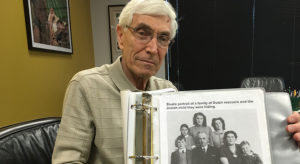Harry Davids’ parents were killed at the Sobibor extermination camp when he was just a child, so he knows all too well what happens when good people don’t act when confronted with wrongdoing. He also knows the positive difference a single person can make in the world. Harry, a Jew born into Nazi-occupied Holland, owes his own survival to members of the Dutch resistance.
“I was taken into hiding by a family of upstanding people in the northern part of the Netherlands who kept me safe until after the war was over,” the Sherman Oaks resident explained.
As the world prepares to commemorate International Holocaust Remembrance Day on January 27, Harry, 75, is committed to teaching others about the atrocities of the past, and he is an active volunteer with Jewish World Watch, speaking out against contemporary genocides taking place around the globe.
You too can help. You can join Harry and Jewish World Watch in taking action against genocides and mass atrocities going on right now and work to prevent more from taking place in the future.
The legislation will create a mass atrocities task force, require annual reporting on regions most at risk of mass atrocities, and provide training for foreign service offices to better recognize early warning signs of violent conflict.
Show you care – and demand that your representatives follow suit. As Harry has observed, “So many people are involved facing life and death situations, and most people don’t seem to care very much about it.”
[su_row class=”bluebg”][su_column size=”1/6″][/su_column] [su_column size=”4/6″]
[/su_column] [su_column size=”1/6″][/su_column][/su_row]
5 Questions for Harry Davids
What happened to you and your family during the Holocaust?
I was born in the middle of the Holocaust in the fall of 1942, and that created a major problem for my parents, who were not able to go into hiding because my mother was expecting. As a result, they lost their lives. I was taken into hiding by a family of upstanding people in the northern part of the Netherlands, who kept me safe until after the war was over. After the war was over I was taken to South Africa by an uncle who found out about me, and since that time I’ve been doing research into my family history. I’ve learned that 76 members of my family were living in Europe when I was born in the middle of the war. Of them, only 5 of us came out alive. This kind of loss of life could have been avoided if there had been more upstanding people available, and part of my mission today is to try and encourage people to be upstanders.
Can you explain what an upstander is?
I classify people four ways: You can be a perpetrator, you can be a victim, you can be a bystander — which is what most people tend to be — or you can be what I like to call an upstander. The upstanders are responsible for the successes of our world. The bystanders, unfortunately, contribute to bad people doing what they do.
What led you to connect with Jewish World Watch?
I found out about Jewish World Watch some time ago, partly because they’re located in my area, but also more importantly because of the kind of work that they do, which syncs with the kind of work that I would like to do now that I’m retired: to educate people about what has happened, to encourage people to be upstanding people.
Is there a part of the world where there’s conflict that particularly concerns you right now?
What particularly concerns me today is what’s happened in the country formerly known as Burma, today Myanmar. We know that, as of now, somewhere close to 650,000 people were forcibly evicted from the country and forced to group in countries like neighboring Bangladesh, where they’re living in really sordid conditions. Although arrangements are underway to try and get some of them to re-embarcate back to their former country, many of them are scared to do that.
What kinds of things can people do today to make a difference?
There are things that they can do that don’t necessary involve what happened to me, where people took it upon themselves at great risk to take me into their home and hide me and keep me safe from the Germans. We can do some things as basic education, teach people who are imperiled about what the risks are about being part of a minority group. In addition, we can also speak to people to encourage them to stand up and protest against the kinds of evils that we see in the world. We don’t have enough people doing that.


